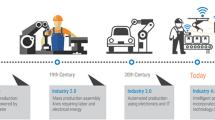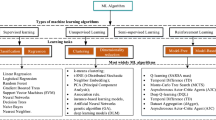Abstract
In order to meet the changing needs of customers, the manufacturing model of products is constantly changing from mass manufacturing model to mass customization model, and to mass personalization model, which is the research object of this paper. Using the research method of system engineering, the system model, characteristic, technology, application blueprints, application scenarios, implementation paths of S-MMP from the perspective of top-level planning are studied. The complete system model of S-MMP proposed in this paper is in line with the development trend of today's industry and meets the urgent needs of enterprises, and it can provide theoretical guidance for enterprises in policy upgrading, model transformation, and business process reengineering. The search results of this paper can provide a reference value for companies to implement high-level planning of the smart system in manufacturing with mass personalization.








Similar content being viewed by others
References
Alizadeh, R., Jia, L., Nellippallil, A. B., Wang, G., Hao, J., Allen, J. K., et al. (2019). Ensemble of surrogates and cross-validation for rapid and accurate predictions using small data sets. Ai Edam-Artificial Intelligence for Engineering Design Analysis and Manufacturing, 33(4), 484–501. https://doi.org/10.1017/s089006041900026x
Chaudhuri, A., & Lillrank, P. (2013). Mass personalization in healthcare: Insights and future research directions. Journal of Advances in Management Research, 10(2), 176–191.
Chen, T.-C.T. (2019). Fuzzy approach for production planning by using a three-dimensional printing-based ubiquitous manufacturing system. Ai Edam-Artificial Intelligence for Engineering Design Analysis and Manufacturing, 33(4), 458–468. https://doi.org/10.1017/s0890060419000222
Chen, T., & Bahsoon, R. (2017). Self-adaptive trade-off decision making for autoscaling cloud-based services. IEEE Transactions on Services Computing, 10(4), 618–632.
Coppola, M., Guo, J., Gill, E., & Croon, G. D. (2019). Provable self-organizing pattern formation by a swarm of robots with limited knowledge. Swarm Intelligence, 13, 59–94. https://doi.org/10.1007/s11721-019-00163-0
Dollarhide, M. E. (2020). Definition of mass customization. Retrieved October 20, 2020, from https://www.investopedia.com/terms/m/masscustomization.asp.
Elmaraghy, H., Schuh, G., Elmaraghy, W., Piller, F., Schönsleben, P., Tseng, M., et al. (2013). Product variety management. CIRP Annals - Manufacturing Technology, 62(2), 629–652.
Fogliatto, F. S., Silveira, G. D., & Borenstein, D. (2012). The mass customization decade: An updated review of the literature. International Journal of Production Economics, 138(1), 14–25.
Franco, D., Devos Ganga, G. M., de Santa-Eulalia, L. A., & Godinho Filho, M. (2020). Consolidated and inconclusive effects of additive manufacturing adoption: A systematic literature review. Computers & Industrial Engineering, 148, 106713. https://doi.org/10.1016/j.cie.2020.106713
Hu, S. J. (2013a). Evolving paradigms of manufacturing: From mass production to mass customization and personalization. Procedia Cirp, 7, 3–8.
Hu, S. J. (2013b). Evolving paradigms of manufacturing: From mass production to mass customization and personalization. Procedia Cirp, 7(12), 3–8.
Janeh, O., Langbehn, E., Steinicke, F., Bruder, G., & Poetter-Nerger, M. (2017). Walking in virtual reality: Effects of manipulated visual self-motion on walking biomechanics. ACM Transactions on Applied Perception, 14(2), 1–15.
Kim, D. Y., Park, J. W., Baek, S., Park, K. B., Kim, H. R., Park, J. I., et al. (2019). A modular factory testbed for the rapid reconfiguration of manufacturing systems. Journal of Intelligent Manufacturing, 31, 661–680. https://doi.org/10.1007/s10845-019-01471-2
Ku, C.-C., Chien, C.-F., & Ma, K.-T. (2020). Digital transformation to empower smart production for Industry 3.5 and an empirical study for textile dyeing. Computers & Industrial Engineering, 142(4), 106297. https://doi.org/10.1016/j.cie.2020.106297
Kumar, A. (2007). From mass customization to mass personalization: A strategic transformation. International Journal of Flexible Manufacturing Systems, 19(4), 533.
Li, W., Wu, W. J., Wang, H. M., Cheng, X. Q., Chen, H. J., Zhou, Z. H., et al. (2017). Crowd intelligence in AI 2.0 era. Frontiers of Information Technology & Electronic Engineering, 18(1), 15–43.
Liu, C., & Yao, J. (2018). Dynamic supply chain integration optimization in service mass customization. Computers & Industrial Engineering, 120, 42–52. https://doi.org/10.1016/j.cie.2018.04.018
Liu, X., & Jin, Y. (2020). Reinforcement learning-based collision avoidance: Impact of reward function and knowledge transfer. Ai Edam-Artificial Intelligence for Engineering Design Analysis and Manufacturing, 34(2), 207–222. https://doi.org/10.1017/s0890060420000141
Liu, Z.-H., Wei, H.-L., Liu, K., & Zhong, Q.-C. (2018). Global identification of electrical and mechanical parameters in PMSM drive based on dynamic self-learning PSO. IEEE Transactions on Power Electronics, 33(12), 10858–10871.
Lohmann, M., Anzanello, M. J., Fogliatto, F. S., & da Silveira, G. C. (2019). Grouping workers with similar learning profiles in mass customization production lines. Computers & Industrial Engineering, 131, 542–551. https://doi.org/10.1016/j.cie.2019.03.012
Long, J. E. (2018). Relationships between common graphical representations used in system engineering. Insight, 21(1), 8–11.
Lora, M., Vinco, S., Fraccaroli, E., Quaglia, D., & Fummi, F. (2018). Analog models manipulation for effective integration in smart system virtual platforms. IEEE Transactions on Computer-Aided Design of Integrated Circuits and Systems, 37(99), 378–391.
Lora, M., Vinco, S., & Fummi, F. (2019). Translation, abstraction and integration for effective smart system design. IEEE Transactions on Computers, 68(10), 1525–1538.
Niblock, M. (1993). Mass customization: The new frontier in business competition: B. Joseph Pine II, Harvard Business School Press. Long Range Planning, 26(6), 142.
Peruzzini, M., Raffaeli, R., Malatesta, M., & Germani, M. (2017). Toward a function-based IT platform for variants redesign of household appliances. Ai Edam-Artificial Intelligence for Engineering Design Analysis and Manufacturing, 31(4), 512–534. https://doi.org/10.1017/s0890060417000427
Potts, M. W., Sartor, P. A., Johnson, A., & Bullock, S. (2020). Assaying the importance of system complexity for the systems engineering community. Systems Engineering, 23(5), 579–596. https://doi.org/10.1002/sys.21550
Saniuk, S., Grabowska, S., & Gajdzik, B. (2020). Social expectations and market changes in the context of developing the industry 4.0 concept. Sustainability, 12(4), 1362. https://doi.org/10.3390/su12041362
Tiihonen, J., & Felfernig, A. (2017). An introduction to personalization and mass customization. Journal of Intelligent Information Systems, 49(2), 1–7. https://doi.org/10.1007/s10844-017-0465-4
Tseng, M. M., Jiao, R. J., & Wang, C. (2010). Design for mass personalization. CIRP Annals - Manufacturing Technology, 59(1), 175–178.
Tseng, M. M., & Piller, F. (2003). The customer centric enterprise—Advances in mass customization and personalization. Advances in Mass Customization & Personalization, 218(4), 361–379.
Xu, Y., Landon, Y., Segonds, S., & Zhang, Y. (2017). A decision support model in mass customization. Computers & Industrial Engineering, 114, 11–21. https://doi.org/10.1016/j.cie.2017.09.046
Yamazaki, Y., & Maeda, J. (1998). The SMART system: An integrated application of automation and information technology in production process. Computers in Industry, 35(1), 87–99.
Yang, Y., Zheng, X., Guo, W., Liu, X., & Chang, V. (2018). Privacy-preserving Smart IoT-based healthcare big data storage and self-adaptive access control system. Information Sciences, 479, 567–592. https://doi.org/10.1016/j.ins.2018.02.005
Yao, Y., & Xu, Y. (2018). Dynamic decision making in mass customization. Computers & Industrial Engineering, 120, 129–136. https://doi.org/10.1016/j.cie.2018.04.025
Yue-ting, Z., Chun, C., & Yun-he, P. (2017). Challenges and opportunities: from big data to knowledge in AI2.0. Frontiers of Information Technology & Electronic Engineering, 18(1), 3–14.
Yu-xin, P., Wen-wu, Z., Chang-sheng, X., Qing-ming, H., et al. (2017). Cross-media analysis and reasoning: Advances and directions. Frontiers of Information Technology & Electronic Engineering, 18(1), 44–57.
Zhang, X., Ming, X., & Qiu, S. (2020). Top-level planning of smart system in manufacturing with mass personalization (MMP): System model, application blueprint, application scenarios, and implementation path. In TMCE 2020, 2020 (pp. 75–88). https://tmce.io.tudelft.nl/proceedings.
Zhang, X., Ming, X., Liu, Z., Qu, Y., & Yin, D. (2019a). State-of-the-art review of customer to business (C2B) model. Computers & Industrial Engineering, 132, 207–222. https://doi.org/10.1016/j.cie.2019.04.039
Zhang, X., Ming, X., Liu, Z., Yin, D., Chen, Z., & Chang, Y. (2019b). A reference framework and overall planning of industrial artificial intelligence (I-AI) for new application scenarios. The International Journal of Advanced Manufacturing Technology, 101(9), 2367–2389. https://doi.org/10.1007/s00170-018-3106-3
Zheng, N. N., Liu, Z. Y., Ren, P. J., Yong-Qiang, M. A., Chen, S. T., Si-Yu, Y. U., et al. (2017). Hybrid-augmented intelligence:Collaboration and cognition. Frontiers of Information Technology & Electronic Engineering, 18(2), 153–179.
Zhou, F., Ji, Y., & Jiao, R. J. (2013). Affective and cognitive design for mass personalization: Status and prospect. Journal of Intelligent Manufacturing, 24(5), 1047–1069. https://doi.org/10.1007/s10845-012-0673-2
Zimmermann, A., Specht, M., & Lorenz, A. (2005). Personalization and context management. User Modeling and User-Adapted Interaction, 15(3/4), 275–302. https://doi.org/10.1007/s11257-005-1092-2
Acknowledgements
The authors would like to thank Producer Service Development Innovation Center of Shanghai Jiao Tong University, Shanghai Research Center for industrial Informatics, Shanghai Key Lab of Advanced manufacturing Environment, and Startup Fund for Young Faculty at SJTU for the funding support to this research.
Funding
This work was supported by the National Natural Science Foundation of China [Grant Numbers 71632008, 71971139]; and National Key Research and Development Program of China [Grant Number 2018YFF0213701].
Author information
Authors and Affiliations
Corresponding author
Additional information
Publisher's Note
Springer Nature remains neutral with regard to jurisdictional claims in published maps and institutional affiliations.
Rights and permissions
About this article
Cite this article
Zhang, X., Ming, X. A Smart system in Manufacturing with Mass Personalization (S-MMP) for blueprint and scenario driven by industrial model transformation. J Intell Manuf 34, 1875–1893 (2023). https://doi.org/10.1007/s10845-021-01883-z
Received:
Accepted:
Published:
Issue Date:
DOI: https://doi.org/10.1007/s10845-021-01883-z




